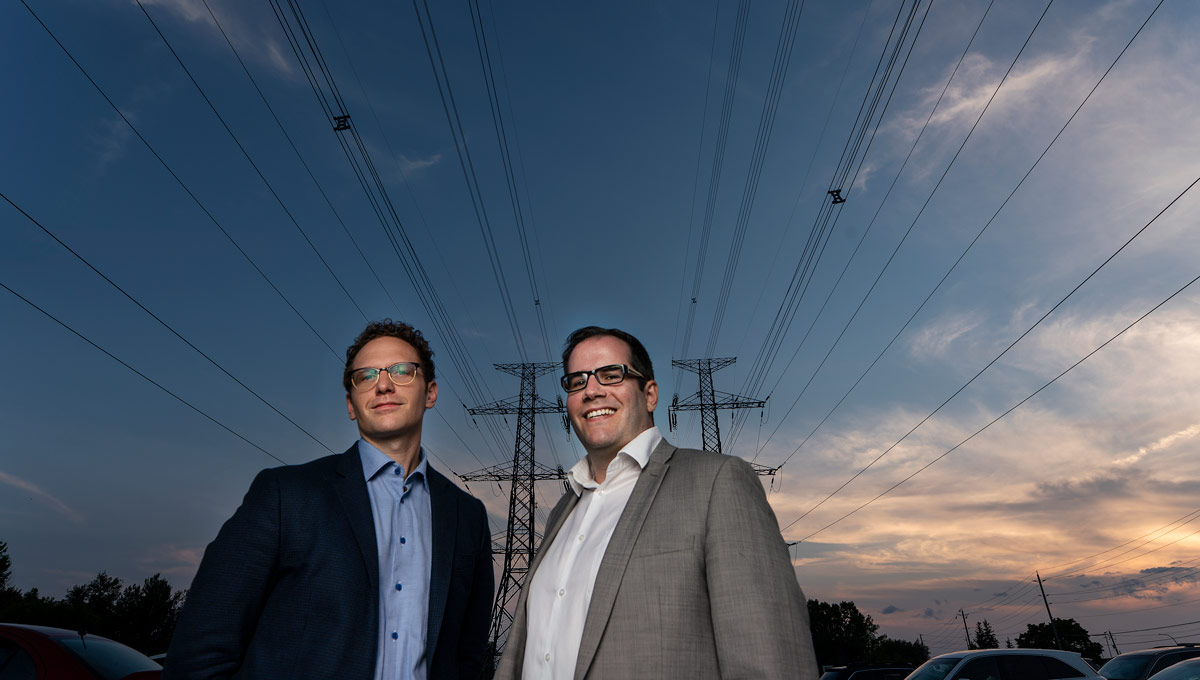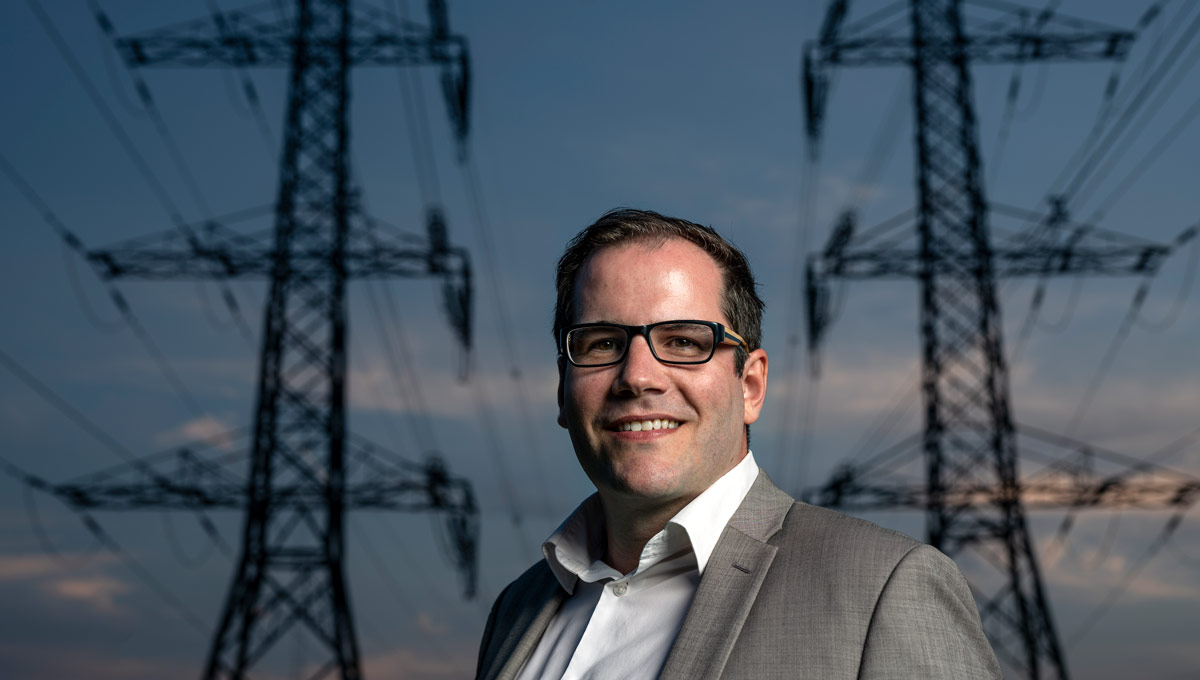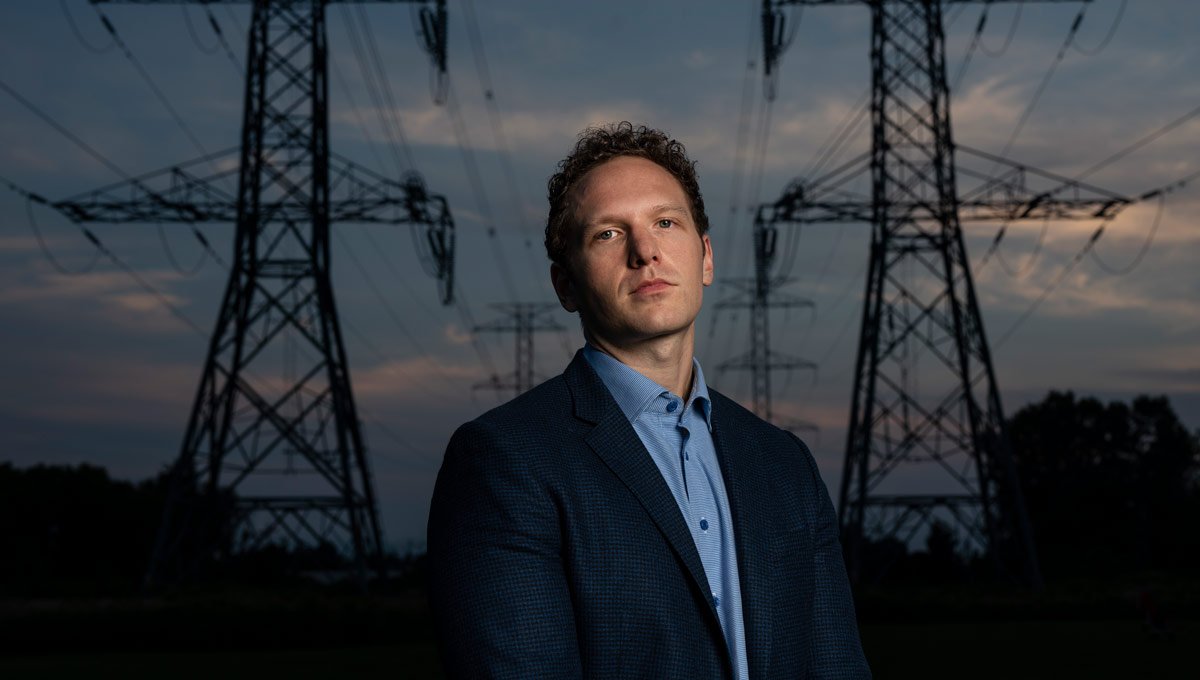By Ellen Tsaprailis
Photos by Chris Roussakis
The tornado that decimated central Ottawa’s Merivale Transformer Station was obviously beyond anyone’s control. However, cyber and physical threats to Canada’s energy sector have grown exponentially in recent years and they are far from random.
Carleton University Prof. Alex Wilner and PhD candidate Casey Babb are spending the next year focused on getting a better sense of potential vulnerabilities within Canada and the United States.
In late June, Wilner and Babb were awarded a research grant from the Canadian Network for Research on Terrorism, Security and Society (TSAS) for their project titled The En-Threat Project: An Assessment of Physical and Cyber Terrorist Threats to Canada’s Energy Sector.

Casey Babb and Alex Wilner
The goal is to help the federal government better understand the threat environment facing the sector, says Babb, who is studying at the Norman Paterson School of International Affairs with a focus on the nexus between terrorism, cyber and artificial intelligence. The study also involves the U.S. because the two energy sectors are so intertwined and connected that it would be negligent to focus just on Canada.
“The intent of this research project is to inform the government and energy sector stakeholders of the current threat environment facing the sector, what these threats could mean from a national security perspective, and what steps could, or ought to be taken to ensure Canadians have a well-protected, reliable and resilient energy sector,” says Babb.
The project will likely produce a range of findings, says Wilner, including threat assessments, lessons learned, best practices and policy recommendations. “Some of these may be especially valuable to Canada and the United States. But other findings may provide broader, more general insights.”

Threats to Canada’s Energy Sector Are Increasingly Sophisticated
Global threats targeting the energy sector have become increasingly sophisticated and pervasive over the last number of years and they vary widely in nature, tactics and scope.
Examples include the 2008-2009 bombings of Encana-owned gas pipelines in British Columbia, the massive cyberattack on Saudi Aramco in 2012, the Algerian gas plant attack in 2013, and the 2016 attacks that left parts of Kiev, Ukraine in the dark.
“We’re also seeing threats being made against energy sector assets,” says Babb. “For example, Hezbollah has repeatedly threatened Israel’s ammonia facilities.”
Wilner and Casey will conduct site assessments of some of Canada’s most critical energy infrastructure and assets.
Moreover, they have developed a questionnaire that has been disseminated through the Canadian Cyber Incident Response Centre—yielding insightful findings to Canada’s cyber threat environment as it pertains to the energy sector. More than 30 companies have completed the survey and, according to Babb, “some of the information received is quite alarming.”

Capturing a North American Perspective
Babb will also speak American experts, including interviews at the United States Department of Energy and the Department of Homeland Security. With Canada’s energy sector intrinsically tied to the U.S. in production, trade and policy, Wilner says they need to capture a North American perspective.
“The interviews will help us get a sense from our U.S. partners what threats they are seeing. What should Canada be most concerned about and what they consider to be areas of mutual concern,” says Babb. “We can’t do this in silos.”
“Threats to Canada’s energy sector, industries, and infrastructure continue to evolve,” says Wilner. “The project’s goal is ultimately about exploring that evolution, both within the physical and digital domain, and uncovering which sectors, assets and networks are most threatened and how.”
The Canadian government has already spent time and effort thinking about counterterrorism, cybersecurity and infrastructure protection, says Wilner.
“The story isn’t necessarily all doom and gloom. Canada has a reasonably robust counterterrorism strategy that takes into consideration terrorist threats to the energy sector.
“Canada has also built lasting relationships across the public and private sector, and internationally, towards better defending its energy assets against physical attack. But I do expect the project will uncover novel threats, challenges and concerns emanating from cyberspace, and derive lessons from international developments in cybersecurity relevant to Canada.”
The Canadian Network for Research on Terrorism, Security and Society (TSAS) supports research, and the dissemination of research, related to the threat of terrorism, security responses to terrorism, and the impact of both terrorism and securitization on Canadian society. Led by a consortium of 13 Canadian universities, TSAS is funded by a partnership grant from the Social Sciences and Humanities Research Council of Canada and a contribution agreement with Public Safety Canada. They are an independent academic organization and neither an arm of the government of Canada nor an advocacy group.
Thursday, October 18, 2018 in Faculty of Public and Global Affairs, Research
Share: Twitter, Facebook



